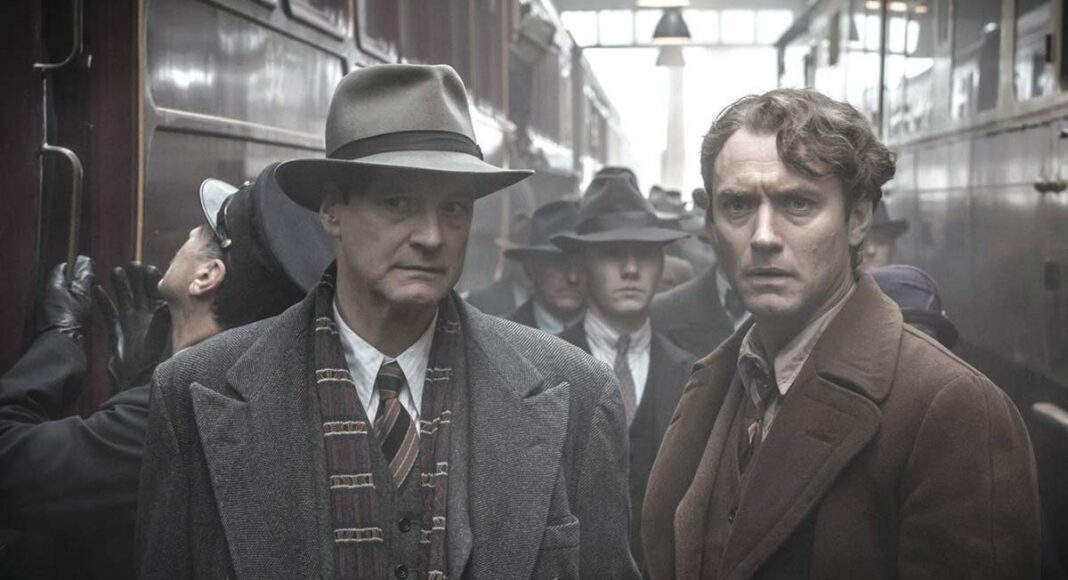Maybe it’s because my high school mounted a stage production of Look Homeward Angel when I was a senior, and I had a big crush on the guy who played the lead, but I’ve always had a soft spot for Thomas Wolfe’s coming-of-age novel, and the mystique of its author. Both figure prominently in the literary biopic Genius, which delves into the relationship between Wolfe and his editor at Charles Scribner’s Sons, the legendary Maxwell Perkins—the designated “genius” of the title—who was, by the time he met Wolfe, already famed as the editor who shepherded both Ernest Hemingway and F. Scott Fitzgerald to publication in the 1920s.
Based on the biography, Max Perkins: Editor of Genius, by A. Scott Berg, the movie depicts Wolfe as a larger-than-life persona, eager to swallow life whole, and blast it out again in torrents of gorgeous prose. It’s a view of the author that perhaps you can best appreciate if you fell in love with Wolfe’s great, sprawling verbiage at age 17. Jude Law is way over the top in the role, with his frenzied eyes and Southern-fried drawl, but his performance conveys the essence of a man utterly, passionately besotted by words.
In contrast to Law’s flamboyance, the movie gives us stoic, thoughtful, dependable Colin Firth as editor Perkins. At the time the movie begins, in 1929, Perkins is a happily married father of five daughters, who takes the commuter train into New York City every day, usually with a manuscript he’s reading in hand. Having wrangled with the likes of Fitzgerald and Hemingway, he chooses his words with great care, for maximum impact. Firth plays Max as a man so button-down, he never takes off his fedora, even listening to the radio at night by his own fireside.
It makes sense that the director of Genius, award-winning stage director Michael Grandage, making his film debut, is also an actor. Working from a script by John Logan (Hugo; Skyfall), Grandage turns the story of these two literary giants into a character study; a pas-de-deux between polar opposites, where the actor’s nuance is as crucial as bluster in moving the story forward. (In Law’s performance as well as Firth’s. Watch Law’s face when someone confronts Tom with a hard, unexpected truth).
Moving the story forward is also Max’s job description, and the film’s backstage look at the business of publishing, as he and Tom tussle over every line and page, is as fascinating as it is mind-boggling. Granted, Wolfe was an extreme case; in the movie, he delivers the manuscript for his second novel, Of Time and the River, in a parade of paper-filled crates, totaling 5,000 hand-written pages. (And he keeps adding more.) It takes a fleet of Scribner’s typists months to pound it into typed pages before the editing can even begin.
The movie is as in love with words and their power as Tom is. The filmmakers acknowledge Max’s point, that a book’s primary function is to tell a story, and if excessive verbiage—no matter how gloriously written—gets in the way, out it goes. But it also sympathizes with Tom’s lust for words for their own sake. When Max explains to Tom why an achingly beautiful passage has to go, first he reads it out loud, so we can all enjoy it.
Nicole Kidman adds a dark, waspish note as Tom’s unstable lover, Aline Bernstein. A stage set designer married to someone else, she’s left her family for Tom, and reacts in volatile ways to think she might be losing him to his new friendship with Max. Guy Pearce seems a bit too robust and forthright to convey the romantic tragedy of Fitzgerald, but Dominic West is great in his one scene as Hemingway.
It’s a shame this movie’s own preview trailer gave away so much; it’s difficult to get swept up in the story when you know what’s coming. But there’s still enough of interest here, in both the era and the industry, to keep us engaged, lit geeks and normal people alike.
GENIUS
***
With Colin Firth, Jude Law, Nicole Kidman, and Laura Linney. Written by John Logan. Directed by Michael Grandage. A Roadside Attractions release. Rated PG-13. 104 minutes.














As an editor and a moviegoer, I disagree with Lisa Jensen’s review of “Genius.†When dissecting Ms. Jensen’s review, it becomes clear that she missed the point of the film through her focus on the antagonist, Thomas Wolfe, instead of on the protagonist, Max Perkins.
This film is not just a clash of styles, it is a story of a relationship between father and son, cast in this case as editor and writer. While Tom takes up the whole screen to gain our attention—not unlike a child who wants to be accepted, even loved—Max, quietly most times but definitely a player in these conversations, moves the childlike Tom toward a completed script. Max says clearly throughout the film that the manuscript is Tom’s, and what Tom decides is what the manuscript will be. But it does not mean that Max will decide that this book will be published in that form.
Yet Max understands his responsibility, and worries about making changes. He tells us that every time he changes words or cuts a sentence, he wonders if he is making it better or if he is just making it different. He holds his responsibility to the author’s intent, to the author’s inner self; he holds the author’s professional and personal life in his hands, and he can only hope that he has acted in Tom’s best interest. Is that not what parents do, consciously or not, as we guide our children to their maturity?
“Genius†is a thought-provoking film, well-acted and well-told. I recommend that you see for yourself what is important.